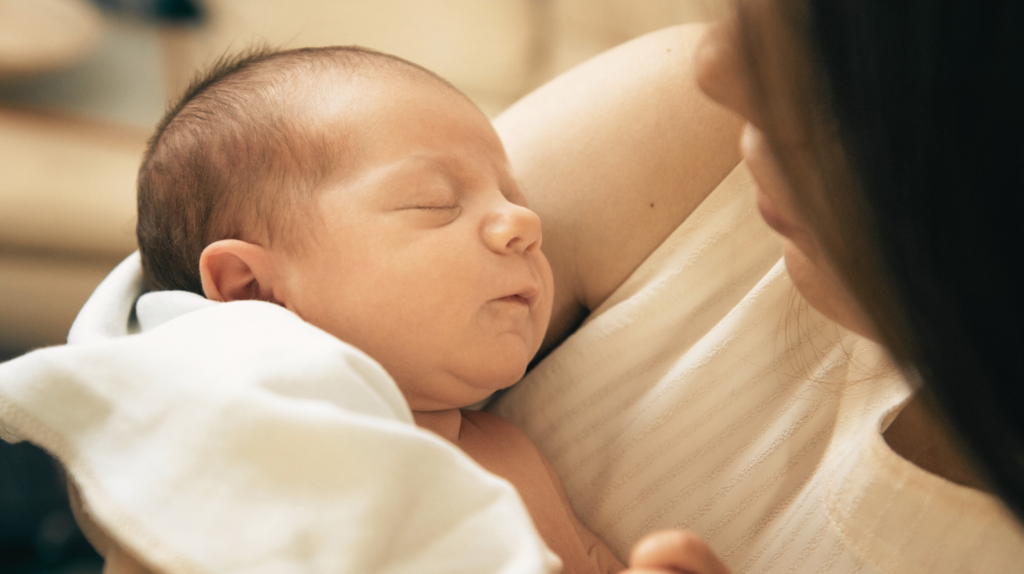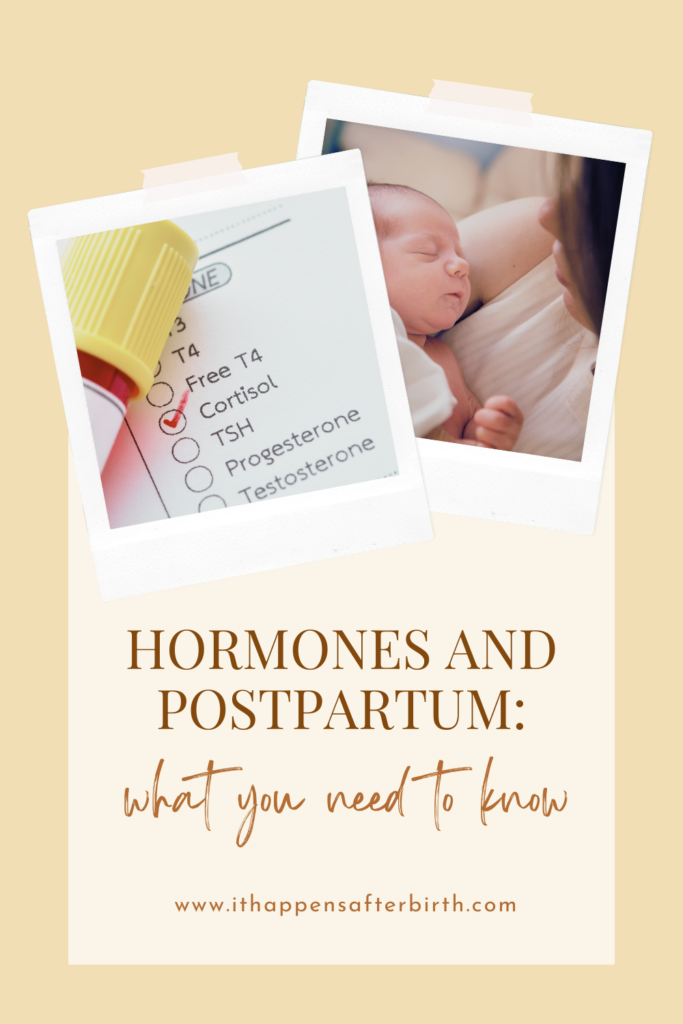Hormones play a huge role in pregnancy, birth, and beyond- here’s what you need to know about postpartum hormones.

We all know that women experience one of the most massive hormone fluctuations of their lives after birth. But do you know how and why these hormones fluctuate- and what it means for you?
Hormonal fluctuations are extremely important through pregnancy, labor, and birth. Without them, you would not be able to carry a pregnancy, birth your baby at the right time, or breastfeed. Hormones play a delicate but important balance to your and your baby’s health.
This is all fantastic when it’s working correctly. But what do normal hormone fluctuations look like, and what happens if they don’t happen in quite the way they’re supposed to?
During pregnancy, hormones like estrogen, progesterone, oxytocin, and prolactin adjust themselves to help you carry a healthy baby. After birth, these hormones will readjust themselves to accommodate the new stage you’re in. Here’s what you need to know about postpartum hormones.
Oxytocin
Oxytocin is the most well-known hormone of all- it comes into play during physical affection, orgasm, pregnancy, birth, and breastfeeding. It’s a key hormone during birth, enables breastfeeding, and facilitates bonding after your baby is born.
During pregnancy and birth, oxytocin levels rise. After birth, they will continue to rise- which is good! Oxytocin functions to help your uterus to contract immediately after birth, which lessens the chance of a postpartum hemorrhage. It will continue to release itself during key moments like skin-to-skin with your baby, which helps with bonding. It also helps the muscles in your breasts contract during breastfeeding to bring milk down the ducts to your baby. (This is what we typically know as the “let-down reflex”.)
It’s very rare to experience too-low or too-high oxytocin levels. It’s a hormone that releases as needed and helps you to feel relaxed and less stressed.
Prolactin
Prolactin is a hormone that functions very similarly to oxytocin. It helps your body with the process of making breastmilk, and it also helps you to relax and bond with your newborn. While oxytocin is often referred to as the “love hormone”, prolactin is the “mothering hormone”.
Prolactin levels start to increase during pregnancy and stay elevated after birth, through breastfeeding. They will begin to fall after the first week postpartum, but levels will stay higher in breastfeeding women than in non-breastfeeding women.
Estrogen
Estrogen is one of the main hormones that help maintain a healthy pregnancy. It does amazing things like maintain a strong uterine lining and kickstart the development of baby’s organs. For after birth, it also helps with growth of breast tissue and even plays a role in milk flow.
While your body needs estrogen levels to remain high during pregnancy, this hormone is needed in lesser quantities after birth. Because of that, levels will fall shortly after birth.
Progesterone
Progesterone is the other super hormone that helps to facilitate and keep a healthy pregnancy! Like estrogen, it helps keep the uterine line strong and ensure it will be ready for the implanted egg. It also (along with another hormone, relaxin) helps your ligaments and joints to soften. This is a key element to preparing for labor!
Also like estrogen, high levels of progesterone are no longer needed after birth, and levels will fall shortly after.
Cortisol
Another hormone to be aware of is the hormone cortisol. It may not play a part in facilitating pregnancy, birth, or breastfeeding, but it’s important just the same. Cortisol is released when stress levels in the body are elevated, and is a key factor in our stress response. We’ll get into why this is important down below.
What happens to hormones postpartum?
Within the first few days after birth, your body will go through a major rearranging of hormones. The hormones needed to keep you and your baby healthy after birth are different than what’s needed during pregnancy or birth.
Estrogen and progesterone begin to decrease rapidly very soon after birth. Conversely, oxytocin and prolactin will increase and stay high after birth. You will also experience a surge of endorphins (the feel-goods of the brain) immediately after birth. Endorphins will remain at a higher than normal level before evening out around 2 weeks after birth.
What does the postpartum hormones crash mean for me?
Estrogen and progesterone don’t just work together to maintain a healthy pregnancy- they also help to maintain your mood. Not only that, they decrease very suddenly after birth. Your body has gotten used to higher levels during these past nine months, so for them to suddenly disappear is enough to send your body into a tailspin.
Oxytocin, prolactin, and endorphins remain high after giving birth, but that’s not quite enough to combat the effects of the hormone crash. Due to the sudden decrease of estrogen and progesterone, you may experience symptoms and emotions like
- Weepiness
- Sadness
- Anxiety
- Mood swings
- Mood lows that can feel like depression
This is what is most commonly known as “the baby blues”, and up to 85% of postpartum women will experience it. Typically, baby blues start around day three postpartum and last anywhere from day 7 to day 14 postpartum. Occasionally, it may last for several weeks.
These feelings are solely hormone-related, and are temporary until your hormones can begin to reorganize themselves post-baby.
However, if you notice that these feelings of sadness or low moods are not going away, or are morphing into something worse like
- Overwhelming fatigue
- Numbness
- Difficulty bonding with baby
- Lack of motivation to take care of yourself or do everyday tasks
- Overwhelming feelings of sadness
- Inability to sleep (outside of typical baby waking)
- Changes in appetite
This is different from baby blues. It could mean that you’re starting to experience postpartum depression or other postpartum mood disorder. Up to 20% of all postpartum women will go on to develop a mood disorder after birth. If you start to feel this way, reach out to your care provider or a trusted person and let them know what’s been going on.
Read more about postpartum mood disorders.
Postpartum hormones in the first week
While prolactin and endorphin levels do remain high immediately after birth, eventually they will begin to balance out again. Prolactin levels play a large part in breastfeeding. However, even in breastfeeding moms, prolactin levels will drop by about 50% after the first week postpartum. Even so, levels will remain higher in breastfeeding moms than non-breastfeeding moms, at least for the first six months.
For non-breastfeeding moms, prolactin will drop to pre-pregnancy levels by the end of the first week postpartum.
Endorphin levels will continue to be raised for the first couple of weeks after birth- this helps maintain your mood, facilitate bonding, and offset baby blues.
Oxytocin levels will rise to help your uterus contract down to regular size and help prevent serious bleeding. It also helps to maintain your mood and feel less stressed, as well as helping you to bond with your baby.
Postpartum Hormones in the first six months and beyond
The good news is, your hormones should start to even out around the six-month mark. But until then, there are a few more ups and downs you may experience.
Cortisol (as we mentioned above) is a hormones that our bodies release as an answer to stress. Having a new baby, experiencing a lack of sleep, lack of support, learning our new normal, etc., can all contribute to us feeling much more stressed than usual. Because of that, cortisol levels can rise after birth and stay elevated for several months postpartum.
The six-month mark is also when many women see their menstrual cycle return. Typically, high prolactin levels help to keep your period away. But levels usually drop close to pre-pregnancy numbers around the six-month mark, especially if your little one is sleeping in longer stretches through the night or beginning to eat more solid food and is nursing less often.
Another well-known effect of postpartum hormones is hair shedding! This usually takes place around 4 months postpartum, but it can happen as early as 2 months. Part of hair loss is due to catching up on extra shedding- because of hormone levels during pregnancy, we don’t shed much hair at all. The other culprit for hair loss is our postpartum hormones.
Another side effect of these hormonal fluctuations are night sweats. If you wake up in the middle of the night drenched in sweat, your postpartum hormones trying to re-balance themselves are likely the culprit.
Long-term effects of postpartum hormones
After a solid 15 months of our hormones changing, we’re probably looking forward to things going back to normal. But will they?
For many women, yes. But for others, hormonal re-balancing doesn’t go as smoothly as they would have liked.
The thyroid works overtime to help with hormones during pregnancy and beyond. As it seeks to reset itself after birth, some women can develop a condition known as postpartum thyroiditis. This is where the thyroid becomes inflamed after birth- first the thyroid will go into overactive mode, then it slows down to become underactive. The symptoms of postpartum throiditis are:
- muscle weakness
- exhaustion
- intolerance to cold
- constipation
Symptoms will typically show up sometime between 1-4 months postpartum.
Cortisol levels can remain high for several months after birth. It’s no secret that there can be a lot of factors that cause stress after having a child! However, prolonged elevated cortisol levels can bring negative effects. Prolonged exposure to high cortisol can manifest as:
- Exhaustion
- Feeling constantly low
- Depression
- Anxiety
- Other physical health problems.
How can I help to balance my hormones?
It will take time for your hormones to balance themselves again. However, there are a few things you can do to help with the process.
Things like making sure to eat nourishing, protein-filled foods, drinking water, and prioritizing rest. (I know, this often isn’t easy to accomplish with a newborn!)
Another way is to take a good-quality postnatal vitamin. We understand the importance of prenatals, but our bodies need help after birth too!
Check out this postnatal vitamin (especially good for breastfeeding moms)
The most important things your body needs after birth are nourishment, hydration, rest, and relaxation. These will go a long way not just in helping with your hormones, but with your physical and emotional recovery too.

